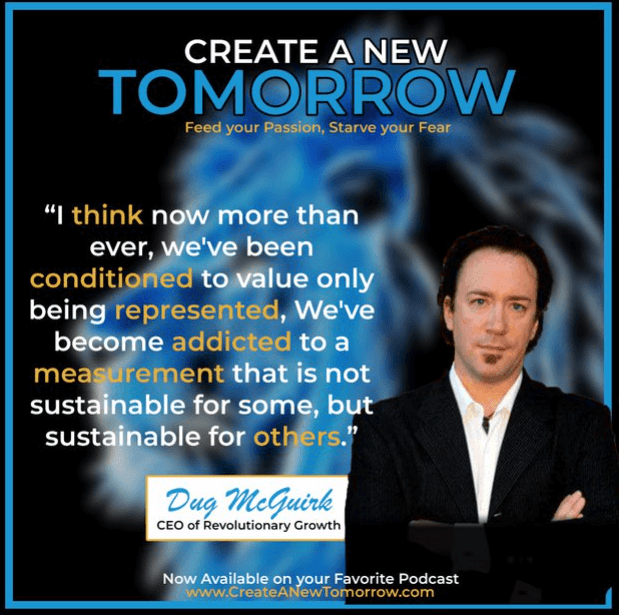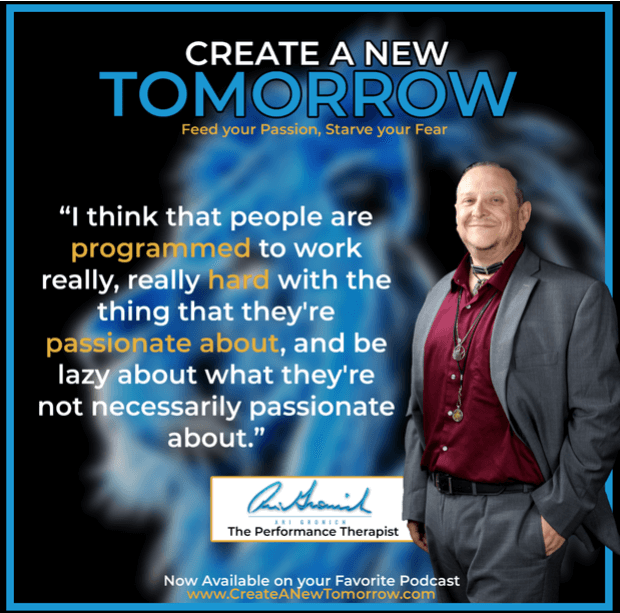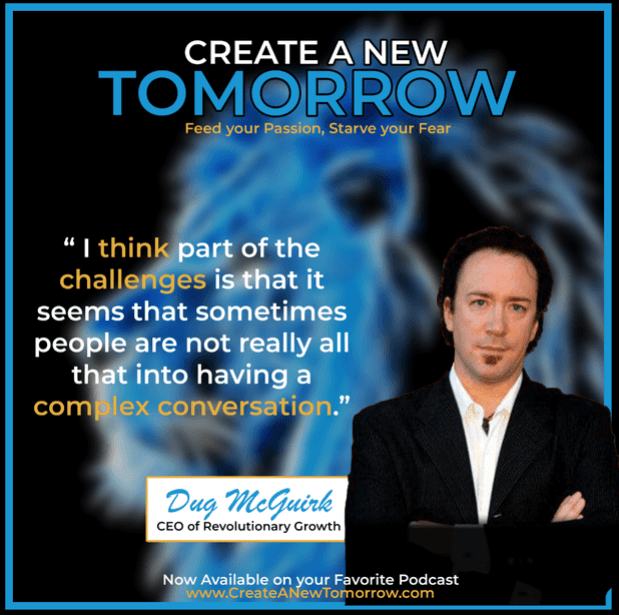
Full-episode here
Ari Gronich
Right. So so let me go kind of take a step back. You talked about the Dickens technique. So what is that? And you know, and in general, I'm going to have a mask a couple questions. So the Dickens technique, what is it and how does it work? And how did it work for you?
Dug McGuirk
Okay, so great questions. So the Dickens process is modeled after the Charles Dickens classic Christmas story. And essentially, it's working with temporal dynamics. So what the experience is, I know you've experienced it. So for anyone who hasn't is it's taking a current behavior, current state current believe current, something that is non resourceful. Looking in the past as to how what impact that has had in your life on the past? What impact is it having currently, so you get your brain to go? Oh, my gosh, that sucks.
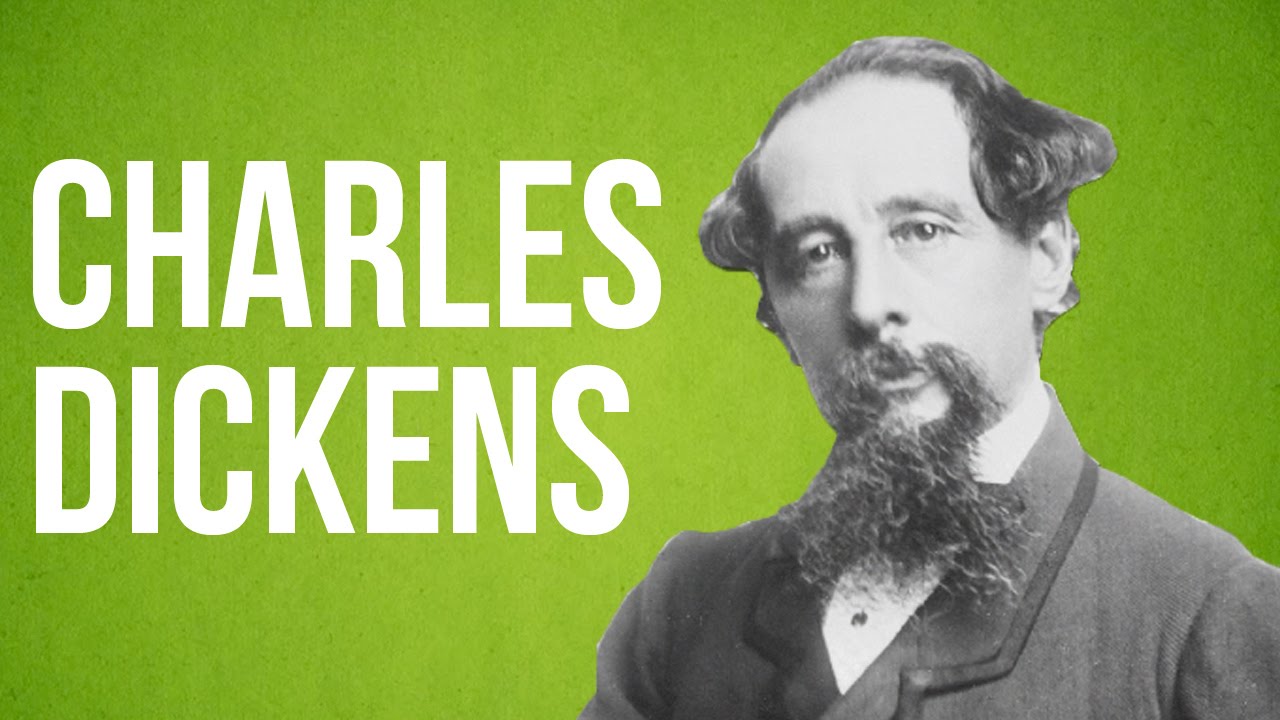
That's horrible. Right? And then you get feels the pain to it. Right? That's what happened with Charles with Ebenezer Scrooge, right? They brought him to the past and said, Look at all this pain This is caused, and then brought it to the present.
Look at how this current behavior is causing this pain. And then to the future. If you don't change, this is what will happen. And then your brain basically goes well, crap, I it sucked in the past, so I can't go there. And like lament, it sucks right now. So I can't even lie to myself right now. And it's going to be even worse in the future. So right now temporarily speaking, it sucks everywhere.
So it forces you to make a decision to no longer continue that behavior and Then you create a new vision of possibility. And then transmute that into probability by creating such a compelling vision that it starts pulling you towards that, that it becomes part of your identity, it becomes in your nervous system who you are, so that you can continue to do the work when you don't necessarily want to.
Ari Gronich
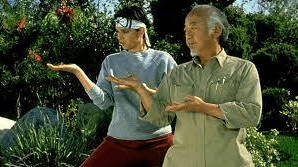
Yeah, you know, it seems like we have a lot of Mr. Miyagi ease, or at least one of the Mr. Miyagi is going going around these days, but not a lot that actually get the job done like he did with Daniel, right? I just watched Cobra Kai on on Netflix. So
Dug McGuirk
amazing. So, so great. I can't wait for three and four.
Ari Gronich
And it was, it was tremendous to see that. I mean, this is 40 years later, it's not like a little bit of time has gone by 40 years. But you know that the idea that people don't want to do the work, I think is a falsity, I think that what you just said about them not knowing maybe what to do, or how to do it, or even like the starting place for it, that would be a little bit more, kind of where I would see a Mr. Miyagi a person that you're accountable to.
And that isn't necessarily charging you, right, Mr. Miyagi, didn't take Daniel as an apprentice and say, you got to pay me, he, you know, he got a lot of work out of that guy. But it was more like, I'm a sword Smith, I need somebody to cover my legacy, and become a sword smith, just like me, so that my legacy can be extended. And that legacy is now being sold right? With the onset of all of these masters of transformation. It's being sold, right.
And so I'm wondering if it's possible, even to have a massive effect on a population when all you're doing is selling the service versus, you know, giving it the way that they used to in the old tribes.
And maybe it's just the work I know, you know, you've had such an amazing ability as an apprentice to take the information that you're given and transmute it into, I can now be a master at this. And I'm not sure what the difference is between you and somebody else who, you know, the 95% that don't do that?
Dug McGuirk
I don't know specifically. It's, it's not it's hard. It's not a general answer. I think each person has some uniqueness. And that's why coaching is important. Right? So that's the work I do, I have, you know, some high level fundamentals, and then it's digging in a little bit deeper to find, okay, this is what's going to motivate you, this is what's going to light the fire under your ass, because different people are motivated by different things. So it's, as far as getting under the hood on that situation.
That's why the, it's important to, you know, obviously get to know somebody. So it's not a global answer. And at the same time, we run a challenge, because I agree with you like, but the thing is, we're, we're, we're drowning in us in seas of information.
Everybody, you know, in the marketing world, and maybe this is part of it as well, we're getting lost in looking for purpose. I think that we're, we're losing the idea of small purpose, leading to big purpose. In many respects, from my humble experience, you know, I look at you know, I have my wife and daughter, and they're the most important people in my world. I, of course, would love to change the world and create world peace and human suffering in its entirety.
And I got to start with my daughter and my wife and me. And that's not as glamorous and oftentimes, we're, and
I think now more than ever, we've been conditioned to value only being represented by how famous we are or how much money we have, or the car we drive or the watch we have and we've become addicted to a measurement that is not sustainable for some, but it's sustainable for others and there's no judgment If it doesn't matter if you know people love stuff, that's great. We all love stuff. Are we becoming a slave to it? So we've been conditioned to think and have an expectation that there is going to be an easy way, right? And people aren't lazy. They're just extraordinarily motivated to work as little as possible.
Ari Gronich
See, you know, it's funny, I kind of agree and kind of disagree with with that statement, because I think that people are programmed to work really, really hard with the thing that they're passionate about, and be lazy about what they're not necessarily passionate about. And for example, you in a studio for 29 hours, and that being a regular thing, that wasn't because you were getting paid enough on salary, for free.
Dug McGuirk
I did for a while
Ari Gronich
would have done that for free. And you would have done it lazy as you know, not lazy hasn't been a thing, I don't think in your life, except for things that you're not passionate about.
Dug McGuirk
Well, yes, and we get distracted, right? So things come up, and we have, you know, shiny object syndrome. So that's where discipline comes in, where, you know, there's a point at which, you know, wisdom and discipline, in my experience has been valuable because, and doing the things are things that we need to do, you know, and or find someone to support us in, like, as an example, you know, admin, and stuff like that, not my note, and sadly, not Heidi's bag, either. So the two of us, you know, our passion is doing the work, our passion is serving is helping people.
So where we need help is in the admin side in stuff like that. But there are times when we have to do it, like it's just, it's we just don't have, you know, we're not, you know, having multiple people doing all that other stuff. And there's that balance, where then we get sucked into kind of a little rabbit holes, or things take more time, and we go, Oh, this sucks, because I have to do these things that I don't want to do, because I'm not passionate, so then I put it off, or I don't do it, and then it backs up. And so it's it's finding that balance.
So I agree. And it's while I totally am on board with you know, finding your passion and going for it. And sometimes your passion may not be able to pay you back those.
Ari Gronich
So, I'm going to take that and and kind of twist it a little bit into cognitive dissonance. Right? So lack of cognitive dissonance, or lack of common sense, sorry. And add in cognitive dissidence,
Dug McGuirk
and emotional dissonance
Ari Gronich
and emotional dissonance. We don't even know what we're feeling anymore.
Dug McGuirk
Yep.
Ari Gronich
Right. So how does that play out in the decisions? Like we're looking at an election season? Right? We just had an amazing debate between our presidents, our president and the person who's seeking office, Mr. Biden. There seems to be a lot of cognitive dissonance and a lack of common sense, in every aspect of life.
Dug McGuirk
Yeah.
Ari Gronich
And I'm, you know, my way of looking at things in general is I try to find out and understand why people choose to do things the way they choose to do them why they're so okay with making decisions that go completely 180 against their own self interest. And by self interest, self interest is not just an individual self interest is a society at large, right?
So, you know, I look at things I'm in the medical world. So I look at things like why would we allow 70,000 chemicals to be put on our food, air, water, food, air and water to be introduced into our society since only the 1970s, late 1970s. We've had over 70,000 new chemicals arrive, most of them are being put into our food and our water. And yet people don't complain. They don't say that isn't cool.
I'm not going to buy that. They're not saying I mean, they're not really up in arms about any of that there's like such a small, insignificant amount of people fighting that Fight, for instance, or if a company, let's say, is poisoning the well water in their own community, and all the people are getting cancer, the employees are not the ones making those decisions.
But why aren't they stopping those decisions? And so that's kind of like that's the cognitive dissonance actions don't equal the results. And so let's talk a little bit about that. Because to me, that can lead into some solutions if we can get a hold of this, what's going on?
Dug McGuirk
So couple things. Obviously, this is such a complex conversation. And I think part of the challenges is that it seems that sometimes people are not really all that into having a complex conversation.
They want it to be a simple yes or no, do this do that the the complexity challenges things and that and that's true for everything, right? The the tyranny of complexity stops people from taking action, because they go, I don't even know what to do. And then they just freeze, right? So when we don't know what to do we freeze a confused mind that says no.
So the complexity and now, you know, we can unpack this into education, right? I mean, I believe that education is failed.
Over the years, I look at, you know, like books from like, what school books were for fifth graders in the like, early 1900s, or the late 1800s. And they are like college level, literally, like and they're unpacking, like you had to know so much about the government and how it ran. And, and you I mean, it was a huge part of the educational system. Why? Because the expectation was, you were likely going to serve, at some level for some short period of time, not be a career politician.
So let's table that for a second. Next, we move into resignation, where people just go, this is I don't even know what to do. And they actually create a sentence Lesia and they close off the consequences.
It becomes an addiction, right? So that part of the nucleus Accumbens , DNA, in our mind, actually bypasses. So we consciously know there's a cognitive dissonance, we consciously know the negative outcome from sad behavior.
But we still do it because we don't feel the consequences. And now we're into the emotional dissonance and the science behind it, how that occurs, is there's actually a part of our brain that wires itself through conditioning through expectations, and through the consumption of said, poisons, which then create this inner weaved experience where it's both cognitive and physiological, which creates the emotional because now it's in our body, we're feeling it, but unlike it's like getting lost in Jersey, right? You know, it's like, well, yeah, you can't get there from here, right?
Have you ever had that happen, where, you know, it's like the hotels across the street, it's going to take about 30 minutes to get there, because you can't make a left turn. And in order to get there, you'd have to be able to in 20 minutes, in five minutes, you have to make a left. Instead, you have to do this giant, huge circle, and then you go out, right, and then people get a case of the effects.
And we see that an addiction and actually, you know, one of the things when I was working in the treatment center what I really came to use as one of my and I still is one of my keynotes is creatures of addict.
And I just point out that we're addicted everyone is addicted to something. And we we get addicted. And I'll use the example like right now when we talked about the debates and the cognitive dissonance that both sides will accuse the other of it and it's unbelievable to watch because we're like wow, like man, I'm just going to take this position.
If we met in the middle would we be okay with this conversation? Like if we just actually took what was going on and in this conversation, whatever that is and met in the middle would you be okay? Because it's so out and yeah, for me, the answer is probably not I think we've we've gone way off course for what's best for you know, humanity.
But that being said, you'll see people actually having that cognitive dissonance dissonance going, you know, no, we got to put this roundup we can't have those weeds. We can't have those weeds and like well, I get it.
However, as you're killing those weeds, you are poisoning yourself and killing the flora in your body. That is necessary. to digest, which is creating all these problems in the first place. So while Yeah, you killed those weeds, you killed yourself in the process.
About our guest.
Dug McGuirk is an accomplished entrepreneur, musician, producer and inspirational speaker. Having run his own production company for 10 years, a partner in an international hardware and software computer company, toured the United States as musician and a top speaker/trainer for Tony Robbins, co-authored Multiple Streams of Inspiration with Jack Canfield (author of Chicken Soup for the Soul) and a Master Practitioner and Trainer of NLP (neuro linguistic programming) and certified in Neo Ericsonian Hypnosis. Dug is well versed in true life experiences and overcoming personal obstacles to achieve success. He has also overcome a serious drug and alcohol problem early in life. As Co Founder of Revolutionary Health, Dug and his wife Heidi along with other Revolutionaries are committed to supporting the Transformation of Lives. Revolutionary Health is a one stop shop for all things Human. Dug is also VP of Training and Development for Palm Healthcare in Delray Beach Florida.
#change #createanewtomorrow #mindfulness #passion #facefear #training #coaching
Visit us at:
https://CreateANewTomorrow.com
Connect with us on Social Media
